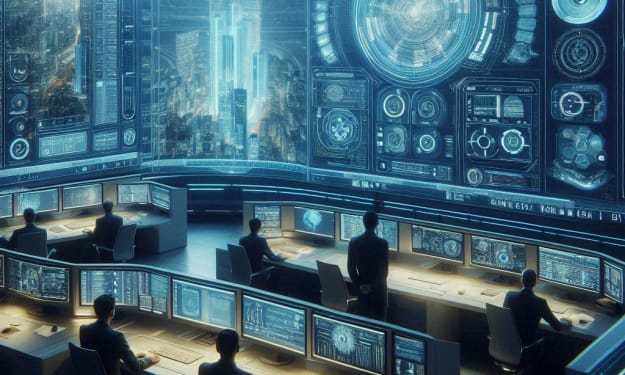Content warning
This story may contain sensitive material or discuss topics that some readers may find distressing. Reader discretion is advised. The views and opinions expressed in this story are those of the author and do not necessarily reflect the official policy or position of Vocal.

INTRODUCTION:
Environmental pollution is one of the biggest threats to life as we know it. Pollution affects the air we breathe, the water we drink, and the ecosystems we depend on. If pollution severity continues to increase; human, animal, and plant populations will break down as they will not be able to cope with a drastically changing environment. There are factors that affect the rates of dispersal and degradation of pollutants. We need to understand the effects of these factors so we know the locations in which pollution will cause the most damage. Today we shall be covering the types of environmental pollution, their effects, and the factors affecting pollutant
Environmental Pollution Definition
Environmental pollution is any addition of erroneous substances or energies to the environment, that causes a change to the composition of the environment. These variables can be air, water, soil, noise, and light and changes to their natural values can have profound consequences for ecosystems and human life.
Pollution occurs when harmful materials (called pollutants) are introduced into the environment.
Types of Environmental Pollution
Pollutants can occur in any phase (solid, liquid, and gas) and can even be in the form of energy transfer such as heat, light, or noise. Let's have a look at some examples of environmental pollution:
Air pollution
Air pollution is caused by the release of gaseous particles, molecules, and particulates into the atmosphere. Small particulates are released as by-products from industrial reactions at high temperatures and pressures and from the exhaust pipes of vehicles. Dangerous gaseous molecules such as greenhouse gases (carbon dioxide, methane, ozone, nitrous oxide), sulphur dioxide, and chlorofluorocarbons (CFCs) are released via the combustion of fossil fuels, industrial processes, agriculture, and deforestation.
Particulates are molecules or compounds that are separated into minute, separate particles. Examples include dust, soot, and metal particulates.
Water pollution
Water pollution involves the addition of polluting gaseous, liquid, and solid particles, molecules, or particulates that alter the composition of a water source. There are many causes of water pollution from human activity: the overapplication of pesticides and fertilizers in agriculture may cause them to runoff into nearby waters, industrial discharge contains dangerous chemicals like metal compounds, solvents, acids, and alkalis, while improperly treated sewage contains millions of disease-carrying pathogens and unwanted nutrients. The addition of heat energy can pollute the water too, this can gradual as a result of global warming or instant from power plant cooling water.
Cooling water in the industry is the water that factories and power plants use to regulate the temperature of their machinery. This water may sound cold, but it is much warmer than oceans, lakes, and rivers so when it is released it will cause a sudden influx of heat.
The plethora of decomposing bacteria and organic material in sewage is a dangerous combination! These bacteria will break down highly organic dead and faecal matter and release huge amounts of nutrients into water sources. Sudden increases in nutrient availability can cause algal populations to increase rapidly and form algal blooms on the surface. These blooms will block sunlight and suffocate the ecosystem's oxygen when broken down by aerobic decomposers.
Soil Pollution
Soil pollution involves the influx of unwanted chemicals to soils, causing them to become contaminated and less fertile. The overuse of fertilisers can cause soils to contain too many nutrients, while the overuse of pesticides can poison soils and reduce biodiversity. Industrial discharge from landfills can introduce a host of unwanted chemicals (hydrocarbons, metal compounds, radioactive elements) to soils. Intensive agriculture such as ploughing and tillage can physically disturb soils and make them more vulnerable.
Light Pollution
Light pollution concerns any change to the normal level of light (ultraviolet or infrared radiation) to a location. Highly developed cities are the biggest driver of light pollution because of the widespread use of neon and fluorescent lights (they emit ultraviolet radiation). Abnormally bright skies can confuse wildlife and cause eye defects. Ultraviolet radiation can cause genetic mutations and cancer.
Noise pollution
Noise pollution is an increase in the amount of noise heard in a certain area. Causes of noise pollution include heavy industrial machinery and vehicles (e.g. on a construction site), or loudspeakers and megaphones at events with lots of people. Noise pollution can put stress on ecosystems and people that live near the source of the noise.
What you can do about air pollution?
Drive your car less. ...
Keep your car in good repair. ...
Turn off your engine. ...
Don't burn your garbage. ...
Limit backyards fire in the city. ...
Plant and care for trees. ...
Switch to electric or hand-powered lawn equipment. ...
Use less energy.
About the Creator
Enjoyed the story? Support the Creator.
Subscribe for free to receive all their stories in your feed. You could also pledge your support or give them a one-off tip, letting them know you appreciate their work.






Comments
There are no comments for this story
Be the first to respond and start the conversation.